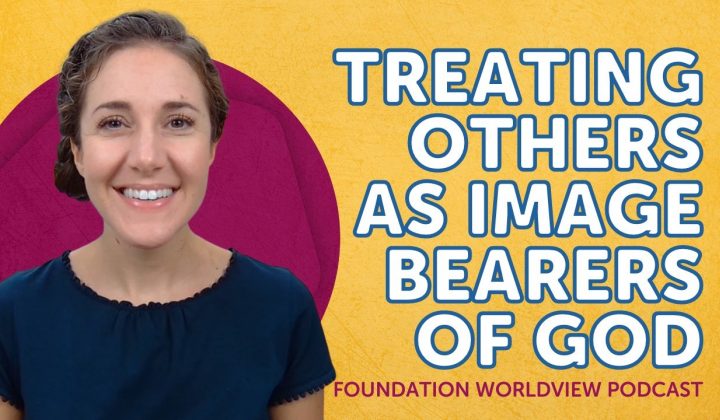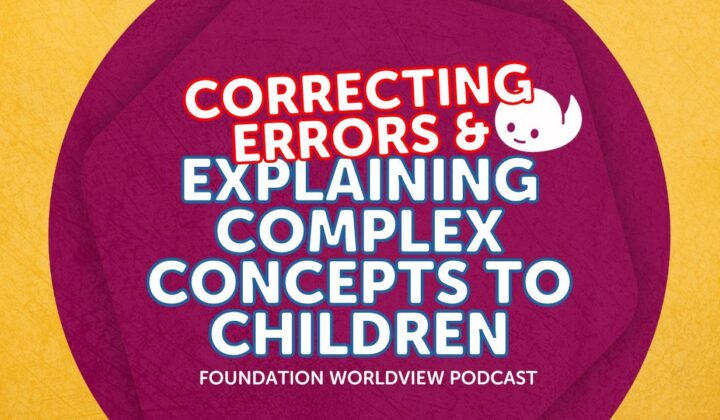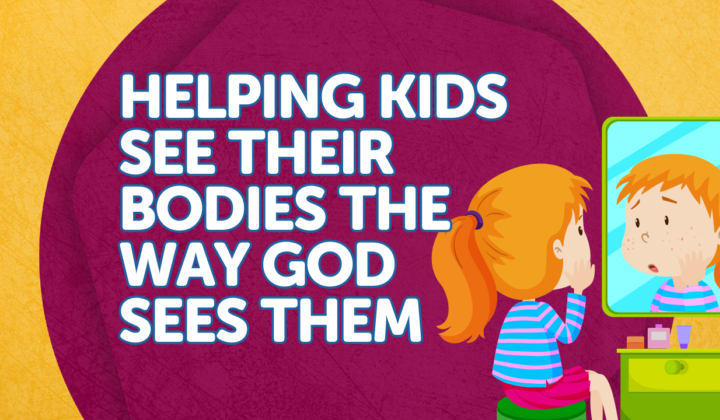Learn more about the journey that led to us equipping kids to carefully evaluate every idea they encounter.
Meet members of our team who have contributed to curriculum development.
Hear from real users of the Foundation Curriculum.
Learn what we believe about God, Jesus, Scripture, and more.
Science and the Bible: Teaching Kids that Faith and Science Coexist
Today's question is, "How can I teach my four-year-old that Christianity and the Bible do not actually contradict science even though the world claims they do? I have always struggled to understand science, and I know of people who have walked away from God believing that the Bible and science contradict each other."
Transcript
Note: The following is an auto-transcript of the podcast recording.
Hello friends, and welcome to another episode of the Foundation Worldview podcast where we seek to answer your questions so that you can equip the children that God has placed in your care to carefully evaluate every idea they encounter and understand the truth of the biblical worldview. I'm your host, Elizabeth Urbanowicz and I'm thrilled that you joined me for another episode today.
Today's question says, "How can I teach my son, who is four, that Christianity in the Bible do not actually contradict science? Even though the world claims they contradict one another? I always struggled to understand science, and I know of people who have walked away from God believing that the Bible and science contradict each other." This is a really important question for us to think through because I think probably most of us know people who have walked away from Christianity because they believe that Christianity contradicts science, and so we want to make sure that we are helping our kids understand that they do not contradict one another.
So before we dive down deep into answering this question today, if you have a question that you would like for me to answer on a future Foundation Worldview podcast, you can submit that question by going to FoundationWorldview.com/podcast. Also ask that you would make sure that you invest the time writing a review of this podcast if you haven't already, clicking the like and share buttons just so that we can help get this content out to more people.
Now, as we're thinking about Christianity and science, and we're thinking about talking about this with our children, especially if we're talking about it with a 4-year-old. Our 4-year-old has no idea that some people claim that science and the Bible contradict one another, however he or she will encounter that claim later in their life. What we want to do in these early ages is really immerse our children in science and the scientific method so that they learn to love it because most of the things that we immerse our kids in are things that they're going to be more inclined to enjoy.
I just think about myself. I was having a conversation a few days ago with someone and I was telling them how much I love history, specifically American history, and the person was kind of like, Ugh, American history so boring. Why do you like that? And really, the reason that I love American history so much is because my mom immersed me and my brother and sister in it when we were growing up. And we grew up in New York, just north of New York City, and so much of the American Revolution took place in our area of the country as well as the Civil War. Even though there weren't battles of the Civil War that were fought there, there were different underground railroad stations there. And my mom was so good at just taking us to different reenactments, to different historical locations. And because she immersed us in this US history that was all around us, I just learned to love it.
And so it's similar with science, that if we immerse our children in science and the scientific method and make it a joy to study the world around them, that they're going to be much more likely to develop a love for science and the scientific method. So an easy way to start this is just by taking our kids on nature walks. Just think about how often do you actually your kids out to walk through the woods or to walk through a state park or just a natural area in your location of the country because nature walks can be so good for just enjoying the world that God has created. You can go on a nature walk in the fall and collect different leaves and then do research on what are the different types of trees that these leaves have come from. You can go and you can listen for birds that are chirping. There's actually even apps on your phone that you can download. And when you're out and you hear a bird chirping, you can hit record and it will record that bird chirp, and then immediately it will pull up for you what bird that is that you are hearing, making that sound. So you can use that app and then go through the woods several different times and see how many different birds you can identify or look for wild flowers or insects, just so many parts of God's creation that can be enjoyed.
Then another thing you can do to help your children just really be immersed in science and the scientific method is involve them in science experiments. And if you homeschool, this can be part of your homeschool, but it doesn't even have to be part of your formal homeschool. Or if you send your kids to public or a Christian school, you can do science experiments at home.
I think about one thing my mom would do with us when we were growing up is when it would rain, she would take out old margarine containers or peanut butter containers. I guess they weren't peanut butter containers because peanut butter containers were mostly glass, but just old plastic containers. And she would actually allow us to create boats out of those containers. And then we would get our rain gear on and we would go to just kind of like this gutter around our house, and we would race our boats and we would look for which boat floated the fastest. And then we would look at, Hmm, why is it that this boat consistently floats the fastest? And we would look at how it was designed and the shape of it.
When I was growing up and I lost my teeth, my mom saved all of my teeth. And then one time she was like, we're going to do an experiment with your teeth. We're going to see which type of foods rot teeth the fastest. So we took all of my different teeth and one of my teeth we put in, I think Coke, another one we put in Sprite, another one we wet with a little bit of water and then dipped in sugar. Another one, I can't remember all the different substances we put them in, but we put it in a bunch of different substances, and then we watched them rot and saw which one rotted the fastest. And I can tell you it was actually the one that was in Coke that rotted the fastest. So might be a good impetus to avoid Coke or any type of sugary beverages. But that was something that was so fun for me just to watch like, oh my goodness, which is going to rot the fastest.
And so just to immerse our kids in science and the scientific method. Now, if you're thinking Elizabeth, I am nowhere near as creative as your mom. That's okay, because I can tell you I am nowhere near as creative as my mom either. My mom is a very creative person, but there are so many different places now that just sell even science in a box kit. So just Google science in a box kits, and there's monthly subscriptions that you can order that will just come in the mail with a box, with a science experiment that you can do with your children. If you don't feel like doing that, just Google easy science experiments for little kids. And there's tons of things that will pop up, just different experiments that you can do because we want to teach our kids to love exploring the natural world that God has created.
And then as we do this, we want to make sure that we are bringing God into the conversation every time. So when I was doing that experiment with my teeth, my mom would talk with me like, isn't it amazing the way that God created our teeth to be so strong? Because when my teeth were rotting and all of those different sugary substances, it took a while. It took a while for them to rotten, and it was like, wow, they've been sitting in here for days. It's taken this long. And isn't it amazing how God created us with teeth that are this strong so that they can last throughout our lifetime?
Then we can even talk with our kids as they get older. Isn't it amazing that God made us as rational beings who can experiment no other being on the planet, no animal on the planet can actually set up the kind of experiments that we can do to actually explore the physical world and to learn more about it and to learn how to create and to design.
We can also discuss with them, isn't it amazing how God set up the physics in this world so that we could discover and experiment? Because if the physical laws of our world were always drastically changing, we would not be able to experiment if the force of gravity was changing every day. There's so many things that we couldn't do, and we would just be at the whim of, oh, what's going to be happening today? But God has set up the laws of nature so that they are stable and we can actually discover and experiment. And then we want to make sure that we're pointing out design, thinking about the experiment with my teeth. There's a design to our teeth. Our teeth aren't just haphazard. They were designed to be able to chew things and to be able to break down food in a way that's going to make it so then our stomach can digest it and our small intestines can absorb the nutrients. There's design there.
Just a few weeks ago, I went for a walk with a friend through this path that goes through my neighborhood, and I was talking with this friend and I was like, you know what? I'm so grateful for this path because in the summer, the trees provide shade from the sun. So this is a nice cool path to walk through in the summer where in the winter the trees are bare, they don't have any leaves on them, so the sun shines through. It actually can provide warmth on colder walks. And the friend looked at me and said, Hmm, isn't that funny? Almost as if they were designed or something. And I was like, I never thought about that. Like yes, there's a purposeful design to trees losing their leaves in the winter and regrowing them for the spring and the summer.
Another thing that I recommend as children grow, we can ask them what if questions. This is something for those of you who have taken your children through our Comparative Worldview curriculum here at Foundation Worldview that this is something that we do in those lessons. Ask kids what would happen if to have them think of the consequences. And so we can ask our kids questions like, what would happen if we just got here accidentally? If we arrived here accidentally by blind unguided evolution? Would we have any reason to trust our senses? Would we have any reason if there was no design to trust that our eyes are showing us things as they actually are? Would we have any reason to trust that our brains are accurately computing the different information that our eyes are taking in? Or what if the universe was just purely the result of an explosion with no design behind it? Would we have any reason to trust that the laws of physics would be consistent, would be constant? If this happened accidentally, would we have any reason to trust this? And so through these types of questions, we want to help our children see that it's actually the biblical worldview that provides us with a consistent view of reality. In fact, through history, it really was Christianity that led to the scientific revolution because before Christianity, most people believed just in Gods who were constantly warring with one another, the Greek and the Roman empires, and even before that. And so if we just have gods that are constantly warring with one another with no rhyme or reason, we would have no reason to trust that we could actually experiment on the world and learn things consistently where it was the belief in the Christian God who was the creator and sustainer of all reality that led to the scientific revolution. And so we want to help our kids see this. We want to help them see that having an intelligent designer is the most plausible explanation for how highly complex forms of life are here on earth. Those of you who have taken your kids through our Biblical Worldview or Comparative Worldview curriculums know that we spend an entire five lessons focusing on that, helping our children see that, believing that there is an intelligent rational being behind the design that we find in life most consistently aligns with the clues that we find all around us.
My final recommendation for helping our kids see that science and the Bible are not contradictory, would be welcoming their questions without needing to come to an answer right away. And I don't mean that we just say, wow, bud, that's a great question. Hopefully we'll find an answer and never returning to that question, but welcoming their questions even if we do not know the answers. And then modeling for them how to find solid answers.
Now, the person who wrote in this question said that they have always struggled to understand science. And I understand you there, that science in school was never my strong suit. And my first year of teaching, I taught science two, three sections of fourth grade at this school where I was. And so there was times when I was looking through the curriculum that I didn't even fully understand what I was supposed to teach my students. So what I would do, is I would go to the children's section of the library and I would park myself in the section that had children's books on the subject that I was about to teach, and I'd pull out all the children's books, I'd read through them, and that would help me get a firm grasp on the scientific concept that I was teaching. So would just highly recommend that you go to the children's section of the library, that you check out tons of different books on science and that you learn right alongside your child as you read through those books.
Well, that's a wrap for this episode. But as always, my prayer for you as we leave this time together, is it a matter of the situation in which you and the children God has placed in your care, find yourselves that you would trust that God is working all things together for your good? By using all things to more into the image of His Son. I'll see you next time.
Related Posts and insights

How to Teach Children to Treat Others As Image Bearers of God?
No matter what age, kids are bound to have questions about violence in the Bible. As a parent, it's important to be prepared to answer these questions in a way that is both honest and intentional. In this podcast, Elizabeth Urbanowicz will talk about how to address and talk to kids about violence in the scripture in a way that is developmentally appropriate and sensitive to their unique needs.

Correcting Errors and Explaining Complex Concepts to Children
Today's question says, "I previously had the false belief that we were spirits in heaven before being conceived. I have been telling my three-year-old this whenever he asked where he was when I was a little girl. How do I correct my error with my son? How do I explain non-existence to a toddler?"

Helping Kids See Their Bodies the Way God Sees Them
How can we help our children view their bodies the way God sees them in a world with comparisons, fad diets, and body shaming?





